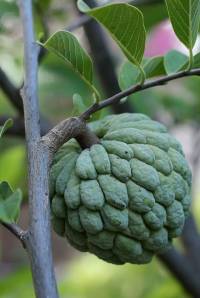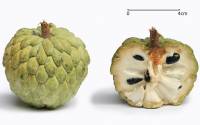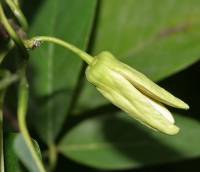Sweetsop, Sugar Apple
| Botanical Information |
| Order | Magnoliales |
| Family | Annonaceae |
| Genus | Annona |
| Common Name | Sweetsop, Sugar Apple |
| Species | A. squamosa |
Maturity days
Planting Months
| Planting months |
| Jan | Feb | Mar | Apr | May | Jun | Jul | Aug | Sep | Oct | Nov | Dec |
| X | X | X | X | X | X | X | X | X | X | X | X |
Permaculture uses
| Permaculture uses |
| Usage 1 | Usage 2 | Usage 3 |
| | Food_Forest | Fruit |
| Growing Condition | Comment |
| Drought Tolerant | No |
| Humidity tolerant | Yes |
| Planting area | Ground |
| Sunlight | Full_sun |
Photos
It tolerates a tropical lowland climate better than its relatives Annona reticulata and Annona cherimola[5] (whose fruits often share the same name)[2] helping make it the most widely cultivated of these species.[7] Annona squamosa is a small, semi-(or late) deciduous,[8] much branched shrub or small tree 3 metres (9.8 ft)[6] to 8 metres (26 ft) tall[8] similar to soursop (Annona muricata). Like most species of Annona, it requires a tropical or subtropical climate with summer temperatures from 25 °C (77 °F) to 41 °C (106 °F), and mean winter temperatures above 15 °C (59 °F). It is sensitive to cold and frost, being defoliated below 10 °C (50 °F) and killed by temperatures of a couple of degrees below freezing. It is only moderately drought-tolerant, requiring at least 700 mm of annual rainfall, and will not produce fruit well during droughts. It will grow from sea level to 2,000 metres (6,600 ft) and does well in hot dry climates, differing in its tolerance of lowland tropics from many of the other fruit bearers in the Annona family. It is quite a prolific bearer, and it will produce fruit in as little as two to three years. A five-year-old tree can produce as many as 50 sugar apples. Poor fruit production has been reported in Florida because there are few natural pollinators (honeybees have a difficult time penetrating the tightly closed female flowers); however, hand pollination with a natural fiber brush is effective in increasing yield. Natural pollinators include beetles (coleoptera) of the families Nitidulidae, Staphylinidae, Chrysomelidae, Curculionidae and Scarabeidae. In traditional Indian, Thai, and American medicine, the leaves are used in a decoction to treat dysentery and urinary tract infection.[13] In traditional Indian medicine, they are also crushed and applied to wounds.[13] In Mexico, the leaves are rubbed on floors and put in hens' nests to repel lice. The diterpenoid alkaloid atisine is the most abundant alkaloid in the root. Other constituents of Annona squamosa include the alkaloids oxophoebine,[14] reticuline,[14] isocorydine,[15] and methylcorydaldine,[15] and the flavonoid quercetin-3-O-glucoside.[16] Bayer AG has patented the extraction process and molecular identity of the annonaceous acetogenin annonin, as well as its use as a biopesticide.[17] Other acetogenins have been isolated from the seeds,[18] bark,[19] and leaves.


